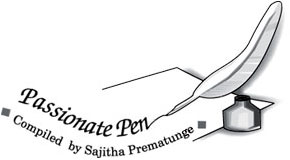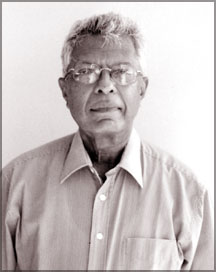|

***********
Would you like to see your words in print?
If you are a talented amateur poet or prose writer with a taste for
quality literature, please email your authentic and original poems and
short stories to [email protected] or post them to Passionate
Pen, Sunday Observer, Associated Newspapers Ceylon Limited, Number 35,
D. R. Wijewardene Mawatha, Colombo 10 to be featured on our new page
Passionate Pen.
They may be written under any title, in any style and consist of
1,500 words or less. You can also look forward to outstanding interviews
with leading personalities in the field of literature, in our quest to
improve our readers' knowledge of quality literature.
**************
' I have an obligation to Sri Lankan literature'
by Sajitha Prematunge
In grade nine it was way out of my league, in grade ten it was a
choice between that or Eastern music (which I would have surely
flunked), in grade eleven I was just comparatively better at it. But at
the University I actually started loving it and literally understood
more than seventy percent of what I read.
'The study of literature' is a peculiar thing. But if there's any one
that can get you enthusiastic enough to embark on this delicate task,
it's the critics. They broaden your perspectives and make the study of
literature all the more interesting.
|

Prof. D. C. R. A. Goonatilleke |
The editor of the Kaleidoscope and author of Sri Lankan English
Literature and Sri Lankan People 1917-2003, Professor D. C. R. A.
Goonatilleke is one such. He has served as the senior Professor of
English, Head of the Department of English as well as Emeritus Professor
of English, University of Kelaniya.
He acquired his Bachelors (Hons.) in English from the University of
Peradeniya and Ph.D. from the University of Lancaster.
He has held a number of prestigious national and international
positions such as founder-editor, Phoenix: Sri Lanka Journal of English
in the Commonwealth; International Chairperson of the Association for
Commonwealth Literature and Language Studies. He's the internationally
recognised authority on Sri Lankan English literature and is currently
dedicating all his time to writing.
Q: How are the Sri Lankan writers faring compared to others?
A: It's true that we haven't produced great writers like R. K.
Narayan or Achebe, but Sri Lankan writers are faring much better now
than before. Post colonial literature has of late become an
internationally recognised area of study, which is advantageous to our
writers.
Q: Where do you picture the Sri Lankan writers heading?
A: For most pioneer Sri Lankan writers the countryside was
their backdrop, which they knew little about.
The result was a very unconvincing picture. But later they switched
to the more urban surroundings widening their concerns to public issues,
such as the insurgencies and the ethnic conflict, breaking away from
their class affiliations.
Moreover Sri Lankan novels were not full blown. Most Sri Lankan
writers work part time and cannot afford the steady application a
full-length novel demands.
However, though they work part-time they could still be professional.
Larkin, T. S. Elliot and Auden were also part-time writers, but they
were devoted to meeting the demands of their craft. Modern writers
choose free verse because they believe it's easier to produce. But even
free verse should fashion a form. Although it dispenses with metre it
should still have rhythm.
Q: But so little guidance is given to the amateur writers?
A: Associations like the English Writers Cooperative and
Wadiya Group are providing guidance in the form of workshops and
publications. But a lot of my hope is riding on English departments of
universities.
Before the 1960s the English departments were Euro-centric, which
inhibited the undergraduates' creative capabilities. But now they are
preoccupied with post-colonial literature. We can't completely disregard
Mainstream literature, since it offers a wider range of creative
possibilities.
Q: What do you think about science fiction?
A: It's an exiting new field, although in truth not new at all
going well beyond Wells. But only recently became critically acclaimed.
This reflects the recent technological advances.
It's more convincing when SF contains possibilities latent in
technological advances, but if it goes beyond this it becomes
unrealistic and unconvincing. Sri Lankan writers have exploited this
before, of which Sir Arthur C. Clarke is the pioneer.
There are quite exceptional pieces such as Harsha Ruwan
Wasalathantri's State Literary Prize winner Dimensional Wonders: The
Time Trek and Priyanthi Wickramasuriya's An Old fashioned Book Shop.
Q: What's your opinion on the current state of literary
criticism, in the local setting?
A: Not very satisfying. The reviews in local newspapers are
clearly the result of favouritism and are rather old fashioned. On the
other hand the universities are showing much more promise due to the new
advances in Literary theory.
Q: Why do you think most critics mainly focus on Western
writing?
A: Actually the tables have turned and now they are
preoccupied with post Colonial literature. I hope the next generation
will strike a balance.
Q: In your view what has been the contribution of expatriates,
for Sri Lankan literature?
A: Some expatriates depict a degenerated picture of Sri Lanka,
demonizing the country. I believe that Michael Ondaatje is an expatriate
every one should be proud of.
His Anil's Ghost is not only very realistic it's also the only novel
that had not degraded Sri Lanka. I hope that others can also emulate his
attitudes towards Sri Lanka.
Q: In your book Sri Lankan English Literature and the Sri
Lankan people 1917-2003, you talked about the lack of state patronage
for literature, do you still see it as an inhibition for literary
conquests?
A: As of late the Department of Cultural Affairs and Library
Services Board has supported amateur writers by publishing their work.
Publishers are also more keen on helping upcoming writers. Therefore
there are many more avenues of publication for the novice.
Finally winding up the interview, Professor Goonatilleke said, "I
feel I have an obligation to Sri Lankan literature. Most people migrate
in search of better positions and fame. But it's important to know that
they have the same chance of getting published in Sri Lanka, and no
amount of fame can replace the contentment of being in one's own
country".
[email protected] |
